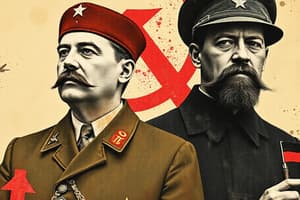Podcast
Questions and Answers
What was the Russian Revolution?
What was the Russian Revolution?
- A series of protests in China
- A massive revolutionary upheaval in 1917 (correct)
- A political campaign in the United States
- An economic reform in the Soviet Union
Who led the Bolsheviks?
Who led the Bolsheviks?
Vladimir Lenin
What was the Guomindang?
What was the Guomindang?
The Chinese Nationalist Party
What is collectivization?
What is collectivization?
Who was the chairman of China's Communist Party from 1949 until 1976?
Who was the chairman of China's Communist Party from 1949 until 1976?
Stalin was the leader of the Soviet Union from 1924 until 1953.
Stalin was the leader of the Soviet Union from 1924 until 1953.
What was the Great Purges?
What was the Great Purges?
What is glasnost?
What is glasnost?
Who was Mikhail Gorbachev?
Who was Mikhail Gorbachev?
The Cuban Missile Crisis was a major standoff between the United States and the ____ in 1962.
The Cuban Missile Crisis was a major standoff between the United States and the ____ in 1962.
Match the leaders with their respective countries:
Match the leaders with their respective countries:
Flashcards are hidden until you start studying
Study Notes
Russian Revolution
- Occurred in 1917, leading to the end of the Romanov dynasty and establishment of Bolshevik power.
- Resulted in the creation of the USSR, which lasted from 1917 to 1991.
Bolsheviks
- Revolutionary party led by Vladimir Lenin, initially known as "the majority".
- Later renamed the Communist Party.
Lenin
- Real name: Vladimir Ilyich Ulyanov (1870-1924).
- Key figure in Russia’s communist revolution and head of the Soviet state from 1917 until death.
Guomindang
- The Chinese Nationalist Party under the leadership of Chiang Kai-shek from 1928.
- Overthrown by the Communist Party in 1949.
Chinese Revolution
- Span of events from 1912 to 1949 marking the transition from imperial rule to communist governance.
- Culminated in the rise of the Communist Party led by Mao Zedong.
Mao Zedong
- Chairman of China's Communist Party and ruler from 1949 until 1976.
Building Socialism
- Refers to the forceful transformation of society by communist regimes upon taking power.
Stalin
- Joseph Vissarionovich Jugashvili (1878-1953); leader of the Soviet Union from 1924 until death.
- "Stalin" translates to "made of steel."
Zhenotdel
- Women's Department of the Communist Party in the USSR (1919-1930).
- Focused on promoting women's equality.
Collectivization
- Rural reform aimed at abolishing private property and consolidating peasants into larger farms.
- Resulted in lower agricultural production.
Cultural Revolution
- China's Great Proletarian Cultural Revolution initiated by Mao Zedong in the mid-1960s.
- Aimed to eradicate capitalist influences, causing widespread chaos.
Great Purges/Terror
- Massive campaigns in the late 1930s to eliminate perceived enemies of the Soviet state.
- Approximately one million executed; millions sent to forced labor camps (gulags).
Cuban Missile Crisis
- 1962 standoff between the U.S. and the Soviet Union over nuclear missiles in Cuba.
- Resolved with USSR removing missiles in exchange for U.S. non-invasion promise.
Nikita Khrushchev
- Leader of the Soviet Union from 1953 to 1964.
Mikhail Gorbachev
- Leader from 1985 to 1991, whose reform initiatives led to the dissolution of the USSR.
Deng Xiaoping
- Leader of China from 1976 to 1997; reformed the economy while maintaining authoritarian political control.
Perestroika
- Economic reform plan implemented by Gorbachev in 1987 aimed at modernizing Soviet industry.
Glasnost
- Gorbachev's policy promoting transparency and freedom of expression, which reduced government censorship.
- Led to increased public awareness of systemic issues within the Soviet Union.
Studying That Suits You
Use AI to generate personalized quizzes and flashcards to suit your learning preferences.




